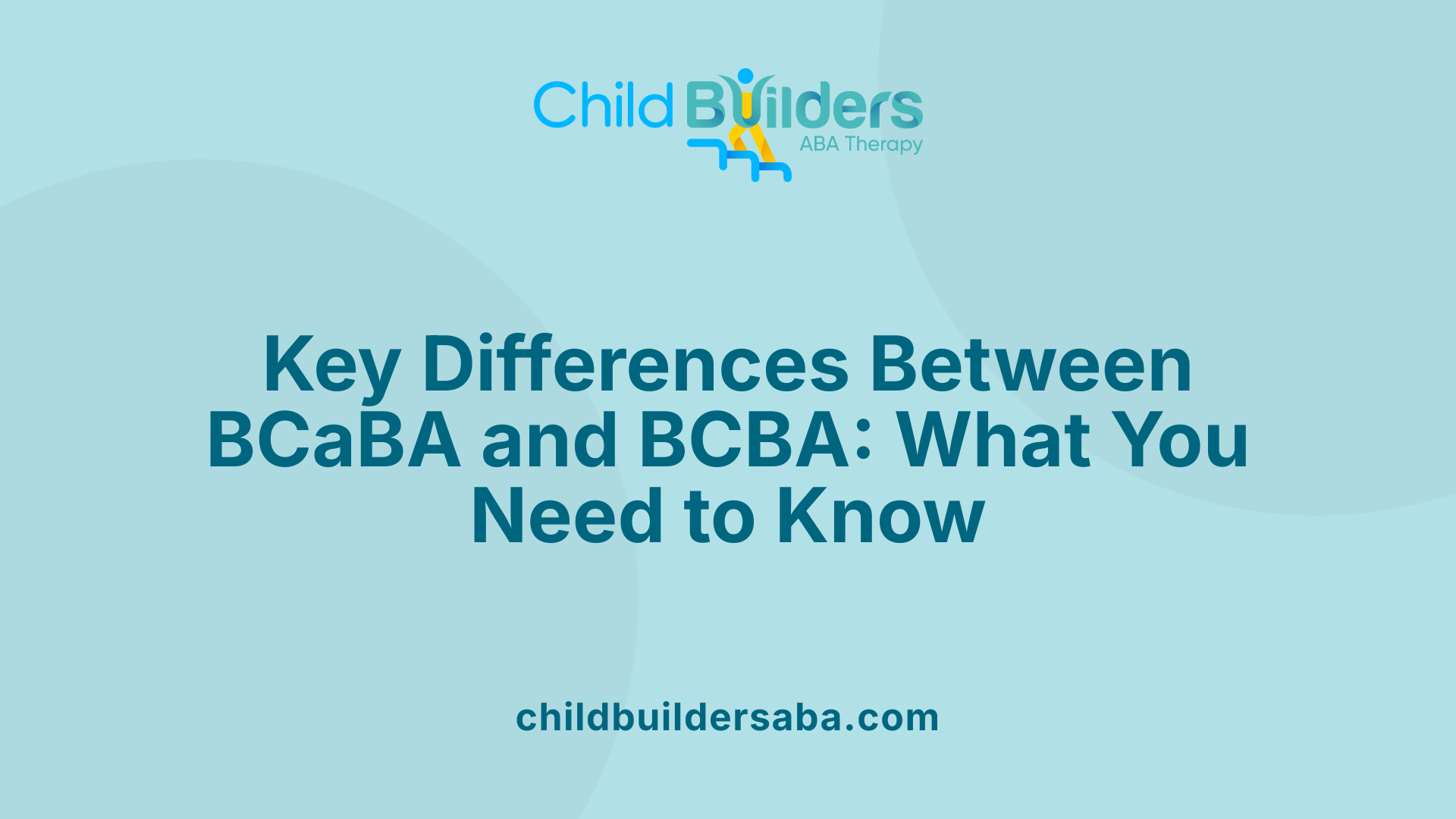BCBA vs. BCaBA

Exploring the Credentials That Drive Behavior Change Services
As the demand for qualified behavior analysts grows rapidly nationwide, understanding the differences between the most common certifications—BCBA, BCaBA, and RBT—is crucial for aspiring professionals, clients, and organizations alike. This article delves into the educational requirements, scope of practice, responsibilities, and career implications of each certification, providing a comprehensive overview to inform educational and career decisions in the dynamic field of behavior analysis.
Certification Levels and Core Differences in Practice

What certifications exist within behavior analysis such as BCBA, BCaBA, and RBT?
Within the field of behavior analysis, there are three primary certifications designed to serve different roles and levels of practice. The most advanced is the BCBA (Board Certified Behavior Analyst), which is a graduate-level credential allowing professionals to work independently, design behavior intervention programs, and supervise others. The BCaBA (Board Certified Assistant Behavior Analyst) is an undergraduate-level certification supporting BCBAs. It requires a bachelor's degree, coursework, supervised fieldwork, and passing an exam, but holders must work under supervision of a BCBA or BCBAD. The RBT (Registered Behavior Technician) is more of a paraprofessional role, working directly with clients under supervision. They undergo 40 hours of training, complete a competency assessment, and pass a certification exam. Each of these roles contributes to delivering effective, evidence-based ABA services while emphasizing professional standards and supervision.
What is the difference between BCaBA and BCBA certifications?
The key differences between BCaBA and BCBA certifications primarily relate to education, scope of work, and supervision requirements. A BCBA requires a master's degree in behavior analysis or a related field, with about 315 hours of ABA coursework and 2,000 supervised fieldwork hours. Once certified, BCBAs can operate independently, develop assessments, craft intervention plans, and supervise BCaBAs and RBTs. In contrast, a BCaBA holds a bachelor’s degree, involves around 180 hours of coursework, and needs 1,000 to 1,300 supervised hours. BCaBAs work under the supervision of a BCBA, supporting implementation of treatment plans and data collection. While BCBAs have broader responsibilities and greater autonomy, BCaBAs play a vital supportive role in treatment delivery, ensuring compliance with ethical and professional standards.
What are the responsibilities and roles associated with each credential?
A BCBA (Board Certified Behavior Analyst) is a highly trained professional responsible for conducting behavioral assessments, developing comprehensive treatment plans, supervising BCBAs and RBTs, and participating in ongoing research. They often work independently across diverse settings like clinics, schools, or community services. An RBT (Registered Behavior Technician) works directly with clients on a daily basis, implementing behavior intervention plans, collecting data, and supporting skill acquisition under the supervision of BCBAs or BCaBAs. BCaBAs (Board Certified Assistant Behavior Analysts) support BCBAs by assisting in the implementation of treatment plans, supervising RBTs, and performing assessments when authorized. Their work is collaborative and supervised. Overall, BCBAs hold primary responsibility for plan development and oversight, while RBTs and BCaBAs focus on direct client services and support.
How long does it typically take to become a BCaBA?
The pathway to becoming a BCaBA usually involves obtaining a bachelor's degree, which typically takes around four years. Following this, candidates complete approximately 180 hours of behavior-analytic coursework, often spread over 12 months if pursued part-time. An essential requirement is accumulating between 1,000 to 1,300 supervised fieldwork hours, carefully documented and approved by the BACB. After completing coursework and supervised experience, candidates can apply for the BCaBA exam, which is a four-hour test with 140 multiple-choice questions. The entire process generally spans approximately one to two years, depending on individual pacing and educational arrangements.
Are the roles of BCaBA and RBT different in terms of responsibilities and practice scope?
Yes, their responsibilities and scope of practice differ significantly. A BCaBA works under the supervision of a BCBA, often engaging in tasks such as developing treatment plans, conducting behavioral assessments, and supervising RBTs. They can oversee and support the implementation of behavior programs but are restricted from working independently in certain areas. RBTs, on the other hand, are responsible for executing treatment plans directly with clients. They collect data, implement interventions, and support skill acquisition on a daily basis. RBTs cannot modify treatment plans or conduct assessments without supervision. The main distinction is that BCBAs have independent authority for designing and adjusting treatment programs, whereas RBTs focus on the direct execution of these programs under supervision, emphasizing their roles as frontline service providers.
Future Outlook and Professional Growth Opportunities
The field of behavior analysis is experiencing exceptional growth, with projections indicating continued demand for qualified professionals across all levels—BCBA, BCaBA, and RBT. For individuals seeking a career with meaningful impact and diverse opportunities, understanding these certifications offers a pathway to enter and progress within this expanding profession. From direct client intervention to high-level assessment and planning, each certification plays a vital role, shaping the future of behavior services and improving lives across various settings. Whether aspiring to work independently as a BCBA or supporting behavioral interventions as an RBT or BCaBA, pursuing these credentials ensures a fulfilling career in one of today's most rapidly evolving health and educational fields.
References
- What's the Difference Between a BCBA and BCaBA? - Purdue Global
- Differences and Opportunities Between BCBA® vs. BCaBA®
- 7 FAQs for RBTs Pursuing BCBA or BCaBA Certification
- BCaBA vs BCBA: What's the Difference Between a BCaBA and a ...
- BCBA vs. BCaBA vs. RBT: Explaining the Differences - AutismCOE
- What's the Difference Between a BCBA and a BCaBA? | UMass Lowell
- ABA Certification Explained: RBT, BCaBA, BCBA, BCBA-D
- What is a BCBA vs. BCABA vs. RBT? - Collaborative Corner
- BCBA vs BCaBA: What's the Difference? -



.jpg)

































































































